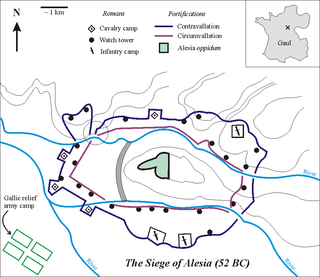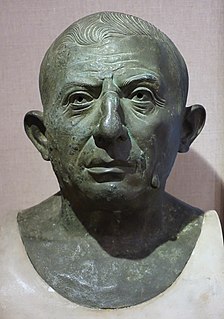Related Research Articles

Year 52 BC was a year of the pre-Julian Roman calendar. At the time, it was known as the Year of the Consulship of Pompeius and Scipio. The denomination 52 BC for this year has been used since the early medieval period, when the Anno Domini calendar era became the prevalent method in Europe for naming years.
Titus Annius Milo Papianus was a Roman political agitator. The son of Gaius Papius Celsus, he was adopted by his maternal grandfather, Titus Annius Luscus. In 52 BC, he was prosecuted for the murder of Publius Clodius Pulcher. He was unsuccessfully defended by his friend, Marcus Tullius Cicero, in the speech Pro Milone.
Publius Clodius Pulcher was a populist Roman politician and street agitator during the time of the First Triumvirate. One of the most colourful personalities of his era, Clodius was descended from the aristocratic Claudian gens, one of Rome's oldest and noblest patrician families, but he contrived to be adopted by an obscure plebeian, so that he could be elected tribune of the plebs. During his term of office, he pushed through an ambitious legislative program, including a grain dole; but he is chiefly remembered for his scandalous lifestyle, which included violating the sanctity of a religious rite reserved solely for women, purportedly with the intention of seducing Caesar's wife; and for his feud with Cicero and Milo, which ended in Clodius' death at the hands of Milo's bodyguards.

The gens Claudia, sometimes written Clodia, was one of the most prominent patrician houses at Rome. The gens traced its origin to the earliest days of the Roman Republic. The first of the Claudii to obtain the consulship was Appius Claudius Sabinus Regillensis, in 495 BC, and from that time its members frequently held the highest offices of the state, both under the Republic and in imperial times.
Lucius Cornelius Lentulus Crus was Consul of the Roman Republic in 49 BC, an opponent of Caesar and supporter of Pompeius in the Civil War during 49 – 48 BC.
The gens Pinaria was one of the most ancient patrician families at Rome. According to tradition, the gens originated long before the founding of the city. The Pinarii are mentioned under the kings, and members of this gens attained the highest offices of the Roman state soon after the establishment of the Republic, beginning with Publius Pinarius Mamercinus Rufus, consul in 489 BC.
The gens Arria was a plebeian family at Rome, which occurs in history beginning in the final century of the Republic, and became quite prominent in imperial times. The first of the gens to achieve prominence was Quintus Arrius, praetor in 72 BC.

The gens Caecilia was a plebeian family at Rome. Members of this gens are mentioned in history as early as the fifth century BC, but the first of the Caecilii who obtained the consulship was Lucius Caecilius Metellus Denter, in 284 BC. The Caecilii Metelli were one of the most powerful families of the late Republic, from the decades before the First Punic War down to the time of Augustus.

The gens Sestia was a family at Rome. The gens was originally patrician, but in later times there were also plebeian members. The only member of the family to obtain the consulship under the Republic was Publius Sestius Capitolinus Vaticanus, in 452 BC.
The gens Fabricia was a plebeian family of Ancient Rome. Members of this gens are known from the early third century BC down to the end of the Republic, but they seldom attained positions of importance in the Roman state.
The gens Rutilia was a plebeian family at ancient Rome. Members of this gens appear in history beginning in the second century BC. The first to obtain the consulship was Publius Rutilius Rufus in 105 BC.
The gens Fufia was a plebeian family at ancient Rome. The gens does not appear to have been of great antiquity, and only appears in history toward the beginning of the first century BC.
The gens Laenia was a minor family at Rome during the first century BC. It is remembered chiefly from two individuals, one a friend of Varro, the other of Cicero. Both had houses at Brundisium, suggesting either that the family came from that region, or that the individuals mentioned were closely related.
The gens Lucceia, occasionally Luceia or Luccia, was a plebeian family at Rome, which flourished during the final century of the Republic and under the early Empire.
The gens Paconia was a minor plebeian family at ancient Rome. No members of this gens obtained any of the higher offices of the Roman state in the time of the Republic, but Aulus Paconius Sabinus held the consulship in AD 58, during the reign of Nero.
The gens Pilia was an obscure plebeian family at ancient Rome. None of the Pilii attained any of the higher magistracies of the Roman state, and members of this gens are known primarily through the writings of Cicero, who was acquainted with a family of this name; but many others are known from inscriptions.

The gens Procilia, sometimes written Procillia, was a minor plebeian family at ancient Rome. Members of this gens are first mentioned during the final century of the Republic, but few of them obtained any position of importance in the Roman state, and they are best known as a result of the historian Procillius, a contemporary of Cicero, whose work has been lost, but who was cited as a source by the Roman antiquarians.
The gens Sallustia, occasionally written Salustia, was a plebeian family at ancient Rome. Members of this gens are first mentioned in the time of Cicero, and from that time they attained particular distinction as statesmen and writers. The most illustrious of the family was the historian Gaius Sallustius Crispus, who wrote valuable works on the Jugurthine War and the Conspiracy of Catiline, which still exist.

The gens Saufeia was a minor plebeian family at ancient Rome. Members of this gens are first mentioned in the final century of the Republic, and from then to the early Empire their name occurs regularly in history, but none of them ever attained the consulship.
References
- 1 2 Cicero, Pro Milone, 17.
- ↑ Cicero, Epistulae ad Atticum, ii. 3.
- ↑ Cicero, Epistulae ad Quintum Fratrem, ii. 2.
- ↑ Cicero, Epistulae ad Familiares, vii. 14.
- ↑ Dictionary of Greek and Roman Biography and Mythology, vol. I, pp. 771–774 ("Publius Clodius Pulcher"), 925 ("Cyrus"); vol. II, pp. 1085, 1086 ("Titus Annius Papianus Milo").